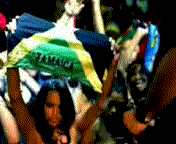
Joel Augustus Rogers (September 6, 1880 (some sources say 1883) — March 26, 1966) author, journalist, historian was born in Negril, Jamaica. Although Rogers was the son of a minister and a school teacher, his parents were not able to afford to give Rogers, or his ten siblings, more than a rudimentary education. Rogers immigrated to the United States in 1906. Rogers lived most of his life in Harlem, but also lived in Chicago for some time. While Rogers was in Chicago he worked as a Pullman porter. The job of Pullman Porter allowed Rogers to travel and observe people. Through this travel Rogers was able to increase his appetite for knowledge, utilizing various libraries in the cities that he visited. This appetite for knowledge would eventually be expressed in Rogers' numerous self-published writings.
Rogers' first book, From "Superman" to Man, self-published in (1917), attacked notions of African inferiority. From Superman to Man is a polemic against the ignorance that fuels racism. Its very title is an ironic twist on both George Bernard Shaw’s Man and Superman and Nietzsche’s idea of the “Superman.” The central plot revolves around a debate between a Pullman porter and a white racist, Southern politician. In essence, the porter is Roger’s (who worked as a Pullman porter while he lived in Chicago) alter ego. Rogers used this debate to air many of his personal philosophies and to debunk the heinous stereotypes about black people and white racial superiority. The porter’s arguments and theories are pulled from a plethora of sources, classical and contemporary, and run the gamut from history, anthropology to biology. Like the novel’s protagonist, Rogers would devote his professional life to such interdisciplinary research. Many of the ideas that permeated Rogers’ later work can be seen germinating in From Superman to Man. Rogers addresses issues such as: the lack of scientific support for the idea of race, black historical vindicationism, and the proliferation of miscegenation throughout history. All of these ideas became focal points for his later writing.
In the 1920's he worked as a journalist on the Pittsburgh Courier, the Chicago Enterprise and was a sub-editor of Marcus Garvey's short-lived Daily Negro Times. He was a newspaper correspondent covering such notable events as the coronation of Emperor Haile Selassie I of Ethiopia (for the New York Amsterdam News); he wrote for various black newspapers (Crisis, American Mercury, The Messenger, the Negro World and Survey Graphic) and served as the only black war correspondent during World War II. Thus, the diversity of his positions proved advantageous for him as he sought to highlight African participation in a global context.
Rogers was a meticulous researcher, astute scholar and very concise writer. He traveled tirelessly on his quest for knowledge which often took him directly to the source for information for his books. While traveling in Europe he frequented libraries, museums, castles and many places of interest that would help to prove Africans had an ancestry and history that the world could and should be proud of. He challenged the biased viewpoint of Eurocentric historians and anthropologists. Rogers spent a lifetime gathering what he called “the bran of history”. The bran of history was the uncollected, unexamined history of the world and for him it was the history of black people. Rogers intended that these neglected parts of history would one day be added to the mainstream body of Western history. He saw black inclusion in white historical discourses as helping to bridge racial divides. The scholarship that Rogers produced was meant to shed light on hitherto unexamined areas of Africana history. This historical goal made Rogers a vindicationist scholar. Vindicationist history attempted to combat the stereotypes of inferiority that often surround black people in history.
Rogers proved that color of skin is not what determines intellectual genius and that Africans have contributed much more to the world than what was previously stated. As a scholar, Rogers was a proponent of the fact that great, black civilizations had flourished in Africa during antiquity. He devoted his scholarship to vindicating historically a place for Africana people within Western history. According to Rogers, many ancient African civilizations had been primal molders of Western civilization and culture. Rogers’ work was also concerned with "the Great Black Man" theory of history. The “Great Black Man” theory shows history, specifically black history, as a mural of achievements by prominent black people throughout history. Rogers devoted a significant amount of his professional life to unearthing facts about people of African ancestry. He intended these facts to be a refutation of contemporary racist beliefs about the inferiority of blacks. Books such as 100 Amazing Facts about the Negro, Sex and Race, and The World’s Great Men of Color all describe remarkable black people throughout the ages and cite significant achievements of the black genius.
Rogers’ theories about race, sex and color can be found in the books Nature Knows No Color-Line, World’s Great Men of Color and the pamphlet Five Negro Presidents all of which deal with the ideas of race, sex and color. Within these works, Rogers questions the concept of race, the origins of racial differentiation and the root of the “color problem.” Rogers felt that the “color problem” was that color [race] was used as social, political and economic determining factors. Rogers astutely surmised that a large percentage of ethnic differences were the result of sociological factors. However, in Rogers’ opinion, often the differences between groups were attributed primarily to physical differences, i.e. color [race]. Rogers deals with the themes of race and sex in the eponymous Race and Sex and also in Nature Knows No Color-Line. Rogers’ research in these tomes is dedicated to examining miscegenation and how that has left a black “strain” in Europe and the Americas since the dawn of time. In Nature Knows No Color-Line, Rogers examines the origins of racial hierarchy and the color problem. Rogers states that the origins of the race problem had never been adequately examined or discussed. Rogers believed that color prejudice generally evolved from issues of domination and power between two physiologically different groups. According to Rogers, color prejudice was a rationale for domination, subjugation and warfare. Societies evolved these mythologies and prejudices in order to pursue their own interests at the expense of other groups. Rogers was trying to show that there is nothing innate about color prejudice. There is no natural distaste for darker skin by lighter-skinned people. Likewise, there is no natural aversion for lighter skin by darker-skinned people.
With these assertions, Rogers was attempting to point out the absurdity of racial divisions. Rogers' belief in one race, humanity, precluded the idea of several different ethnic races. In this, Rogers was a humanist. Rogers used vindicationist history as a tool to bolster his ideas about humanism. Rogers used his scholarship to prove his underlying humanistic thesis: that people were one large family without racial boundaries.
Rogers was self-financed, self educated, self-published. While it is easy to look at Rogers' lack of a formal education as a hindrance to producing scholarly work, it is also quite probable that Rogers' self-taught knowledge freed him from many academic and methodological restrictions thereby allowing him to tackle the difficult racial issues with which he dealt. Rogers’ autodidactism allowed his research to branch organically into various disciplines that other more formally educated scholars might have been loath to attempt. Thus, Rogers’ scholarship incorporates elements of history, anthropology, art history, sociology and archaeology. His works are complete with detailed references. He documenting of his work to encourage scrutiny of his facts are a testament to his due diligence, work ethic and commitment to not only African people, but the world, its history and culture.
Rogers was responsible for bringing many facets of contributionist black history to light, such as the black heritage of figures like Aleksandr Pushkin or the three generations of Dumas (Alexandre Dumas, Père, Alexandre Dumas, Fils and Thomas-Alexandre Dumas) . More importantly, Rogers clearly articulated his ideas about race that were informed by anthropology and biology, rather than social convention. However, Rogers’ most important contribution to black history was not in his vindicationism. Rogers’ most important contribution to black history was his use of vindicationism as a tool to underscore his overlying humanist beliefs. Rogers used the One-drop theory and vindicationism to illustrate the unity of humanity as a people. He discarded the non-scientific definition of race and pursued his own ideas about humanity’s interconnectedness. Although Rogers' work has often been relegated to the ranks of Afrocentric history, his true contributions to Africana scholarship were his nuanced analysis of race and the humanism that permeated his writings.
Rogers was one of the first to detail the lineage of the Queen of England linking her to the Queen Charlotte Sophia Consort of King George III.
Rogers interviewed Marcus Garvey in prison (New York Amsterdam News, 17 November 1926).
Joel Augustus Rogers died on March 26, 1966 in New York City.
Source:
WikipediaMore on Rogers:
HereBonita Jamaica
Beautiful Place. Amazing People.
See you in Jamaica.







